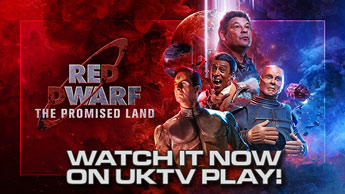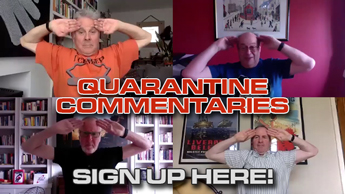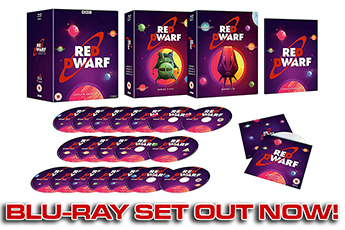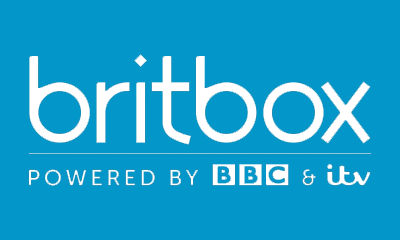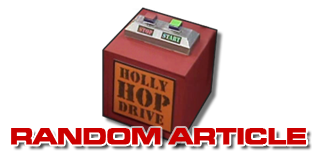 |
Howard Goodall's Flibble Works He's the man responsible for some of the catchiest TV theme tunes ever, and now the movies are beckoning. Mr Flibble whips out his organ and displays it for Red Dwarf's musical maestro. |

Andrew Ellard
Mr Flibble showed Howard his organ and asked for his opinion. Andrew somehow managed to translate this as, 'From doing Not the Nine O'clock News how did you get involved with BLACKADDER?'
I suppose that was a natural progression in that Rowan moved on to Blackadder with John Lloyd who had produced Not the Nine O'clock News. They asked me if I would have a go at the tune. With all of these things, although I do come up with my own ideas, you don't really come up with a good one unless you talk it through with them and the vision they've got.
It was quite obvious, the historical approach they were going for. What's interesting is that the first series, the medieval one with 'Richard the Fourth', was much more filmic and much more historical. That's why we ended up with that tune. Whereas had the first series been the Elizabethan one, the theme would have been slightly gentler, less heroic.
The writing credits changed after the first season...
Really what happened was that Rowan stopped writing - which was probably a good thing (laughs) - and Ben [Elton] came in to work with Richard. And that particular partnership was particularly fruitful.
Did that alter things for you?
It did a bit, because in the second, third and fourth series there was no background, incidental music; it wasn't scored like a movie, because it was done in a studio with an audience, like a sit-com. So it was really just a theme then. In the second series we did different lyrics for every ending, which was to suit the plot of that episode. In a way it became a much easier job for me.
Is it true that those lyrics were knocked up in a pub between the three of you?
It is true, yes. It was very last minute. But in fact, as long as the people throwing things together roughly know what they're trying to achieve, it shouldn't be too difficult. You should be able to do something in two hours that you could be doing in a day.
Mr Flibble asked if Howard fancied a quick blow on his flute, but by this point Andrew seemed to have forgotten how to speak fluent penguin. How did you get involved with RED DWARF?
I suppose it must have been because at that time my agent was Richard Armitage. He had his company, Noel Gay, and when the idea for Red Dwarf came up - Noel Gay were involved early on - [it was] suggested that I have a go at doing the tune.
To be honest, I can't remember what the chain of events was. I remember going in for a meeting with Rob and Doug and we discussed what it might be. And when I came back with the tune I came up with, I think they were somewhat surprised. Because it wasn't quite what anybody had had in mind. But the great thing was that they had the imagination to see that it was quite unusual, and therefore worth sticking with.
[They] could have gone for something more stereotypically science-fiction, and that would have been a shame, I think. I would have been trying to be Dr Who or Star Trek without being itself. The good thing about the theme is that it is just itself - it couldn't be for any other programme.
The lyrics are derived from the plot of the very first programme - Lister and his desire to go and live in Fiji. That's where that came from. As you can see, very quickly one moved away from that area of the narrative - but the song stayed.
On Red Dwarf you get to mess with styles, do SPOOFS...
Well, that's the fun of the job, really. I studied classical music, and one of the things you do when you're studying classical music is you learn how to write in other people's styles, to find out what makes them tick. So it's a natural progression in a way to get into TV programmes where what you're doing is doing different styles. Listening to something and then writing in that style.
Easily the most fun for me is when they would say, 'Now we're going to do it set [around the time of] the murder of JFK' or whatever it was. You put yourself in the skin of that style. We've had everything - electric organs... Red Dwarf has pretty well been everywhere. Even Pride and Prejudice came in at one point. So much of comedy is quoting other things, or associations in order to get the gag.
Do you approach the music quite straight...?
I've never approached any comedy programme thinking 'I'm going to write funny music,' partly because I don't know if such a thing exists. I've basically taken the attitude that if you write a theme that somehow gives the impression of the mood and the style and the period and the characters of that story, that's the most important thing. Not, 'Is it going to make people think they're going to watch a funny programme.' The programme will do that. You don't have to do that job for the audience.
The other thing is that I'm a big believer in tunes. I think a good TV theme is one with a great tune. If you can do that, the fact is that [on their] third listen everybody will remember it. That's actually quite a good thing for a TV programme.
Mr Flibble produced his large horn, which Howard ignored, choosing instead to ask about the show's second opening theme - changing from the 2001-style to the ROCK INTRO...
That was Rob and Doug's idea, actually. We did the grandiose opening and then for the end we had the song, which was up-beat. Ed and Rob and Doug jointly said, 'Can we have a version for the beginning that's more like the end? And anyway we're going to change the titles, it's going to be excerpts from [the show] so it's going to be full of action and movement. The old spaceship going through the air thing isn't going to be the way we start the programme.' So we came up with the idea to have the crazy guitar solo instead.
And it does get the blood pumping...
There's a magazine called Total Guitar - and amongst soloists it's the theme that everybody wants to learn - so Total Guitar actually worked it all out, with someone recreating the music and the midi file so that everybody could play it phrase by phrase! (Laughs)

Some of the music in more recent seasons has been taken from the public domain...
It's partly a practical thing. Because I have a huge number of other commitments - I was away for a whole year making my recent Channel 4 series - combined with the fact that I always do far too much and they never use it all, when they're editing the programme they've got such a huge stock of material they say, 'Why don't we use that stuff we've got, and anything else we need we'll just get from library.'
Because I wasn't around, that suited me fine. It's a practical solution. Sometimes you think somebody's sat down and said, 'This is the way we want to go.' And often it's just a solution to a practical problem.
Mr Flibble began toying with his kazoo. Andrew, meanwhile, said, 'Talking of SERIES VII, was Tikka to Ride your favourite episode?'
I thought that was brilliant. Absolutely brilliant. That was the same season as Ace Rimmer in the Second World War. That was lovely - we did that with a full orchestra and everything, which was a nice thing. They don't always have the budget to do that. We always said when we did that, if another big opportunity arose, that's what we would do, because it really brings it to life.
I thought it was a very strong series, and it was great fun for me to do those things where you score a whole section. The ideas of the programmes are always extremely imaginative, and one thing you've got to be a bit careful of is that, with comedy, it's very speech-based, and there's not much point in having music under comedy speech. Because you're already competing with the audiences' laughter and you've got to hear the gags. So narrative scenes, with two people in a room, you may as well not have music; but if it's a big action scene, that's where I can really come in and help.
Would you be keen to work on the FILM?
One of the things that happens with a very successful TV programme is they get to the point where they're going to get to the movie stage, and there's a question mark - how do you keep it with the freshness and the immediacy of the TV, without losing all that when it becomes BIG. The sheen might make it look and feel fantastic, but the key thing is not to make it less funny by doing that. If you just want an adventure film set in space, there are plenty of them around!
That affects almost every decision you can make, not just the music. How much of the spirit and the sound and the feel of the TV can translate through, and what can we replace, and what people do we need to do this, that and the other? The same would happen with casting, around the key cast you go for a slightly different type of actor than you would have in a TV sit-com.
I did the Mr Bean TV series, and I also did the movie. But in fact I did a completely different score, a different tune and everything, for the movie than for the TV programme. Because it demanded a different scale and there was a different narrative. On the other hand, the same rules applied - the reason I was doing it was because Rowan wanted the music to be sympathetic to the comedy, first and foremost.
Is it hard to come up with the quantity of material a movie demands?
What you see on the movie is much less than what you end up doing when you're doing the job. You spend a long time doing temporary scores for all the screenings and tests and whatnot, you're actually paring down.
I, in any case, come from a classical background where all pieces are longer. (Laughs) So the idea of the scale doesn't frighten me. I do quite a lot of ads, and one of the skills with ads is how do you hit the feeling or the mood in ten seconds, instead of a minute? It is a much harder job.
The same rules apply at every scale. You just have to make it not seem like padding when you go to a bigger scale. Looking back on it, I think it would have been great if Wagner had had somebody say to him, 'Too long. It'd be just as good at half the length.' If he'd had to write for TV, he'd have been a much better composer! (Laughs)
What ads have you done that people will remember?
They'll know my Barclaycard ones with Rowan, and I'm currently doing the ones with Angus Deayton as well. Rowan is making a film based on that character - that's what he's developing at the moment.
Mr Flibble ran out of innuendoes involving musical instruments, so thankfully stayed quiet. Finally, will there ever be a CD release of Red Dwarf music?
I've thought about this in various different shapes and forms. One of the problems is a practical problem to do with the ownership and the rights. The recordings that have been made belong either to Grant Naylor or the BBC. So practically speaking, in order to release a CD, you'd have to do deals with all of that sort of business.
Now that doesn't really affect me. I'm very happy to have someone else sort that out! (Laughs) Nothing would make me happier than for those people who wanted to have a collection of Red Dwarf music to have it - because it's all there. It's just a practical thing. There are other matters to be resolved.
What are you doing now?
I'm working on a new musical, and some of my other musicals are being revived. I'm doing a musical of A Midsummer Night's Dream with Charles Harte, who's my regular lyrical writer now. He's the guy who wrote the lyrics to Phantom of the Opera. It opens in the summer in Exeter, and then goes to the Edinburgh Festival, and then goes to the Opera House, London, and then goes to New York. It's not finished... but it will be! (Laughs).
Mr Flibble enjoyed talking to Howard Goodall, and now that it's over... Mr Flibble is very cross.

